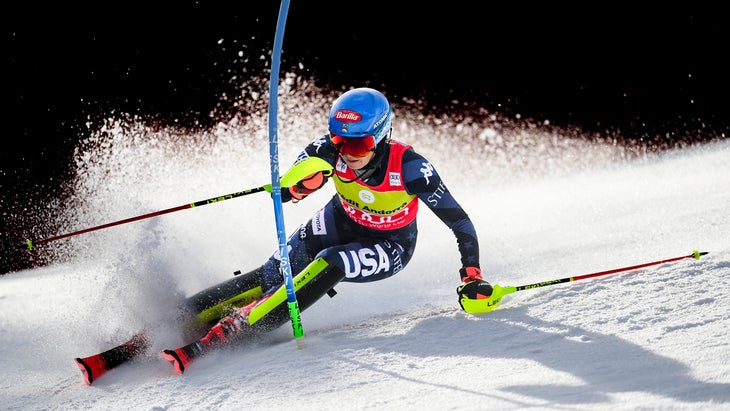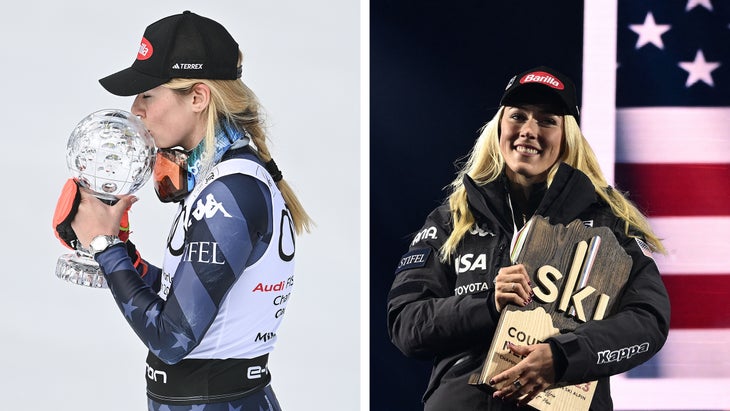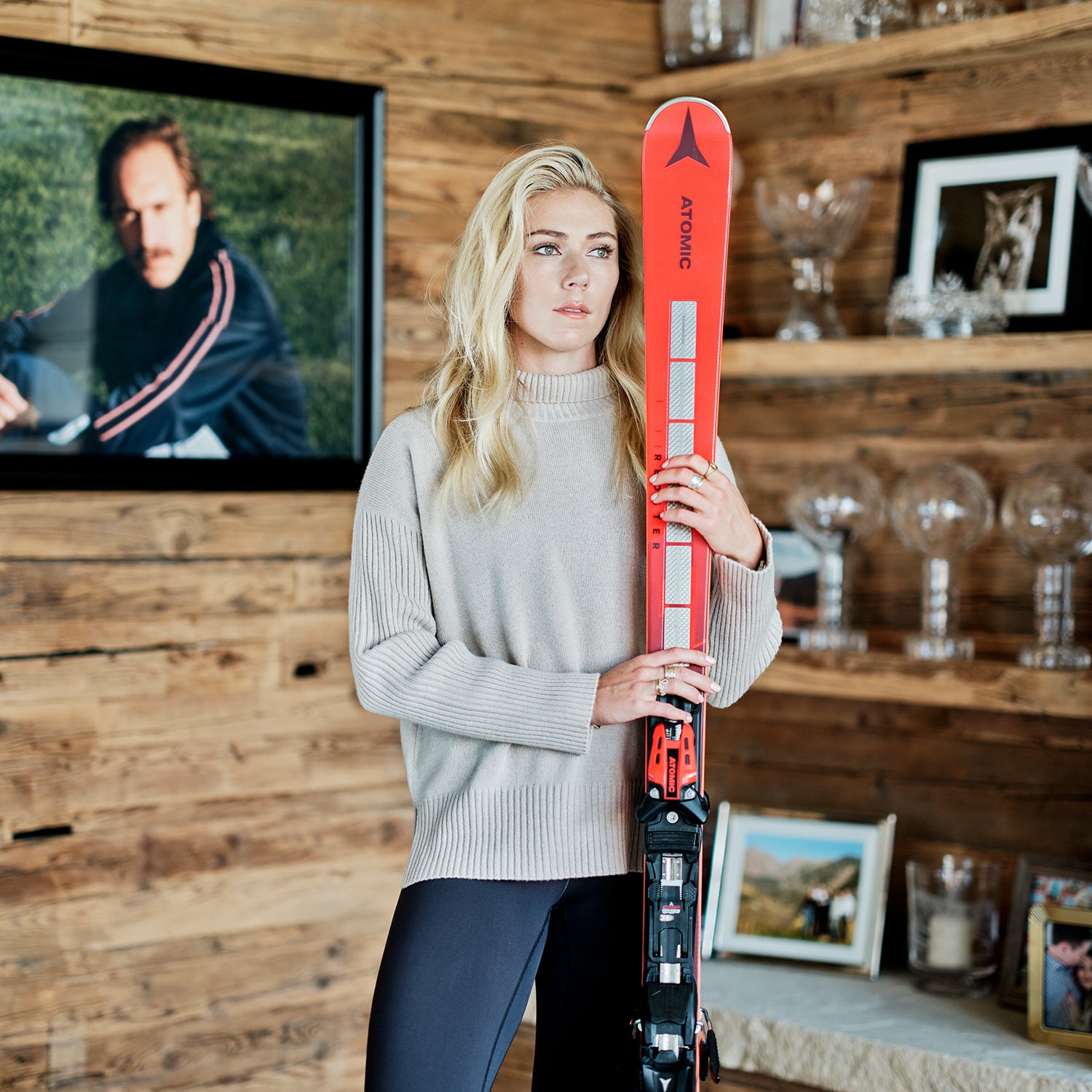Mikaela Shiffrin had a banner year in 2023. On March 11, she notched her 87th World Cup win, breaking the record for most career victories, held for 34 years by Swede Ingemar Stenmark, considered by many to be the most successful ski racer of all time. Shiffrin is now the winningest racer in World Cup history—and at 28 years old, she has plenty of time to add to the tally.
She has a lot going for her, to say the least. Incredible discipline, strength, technical skill—you name it. But Shiffrin has long said that the secret to her success isn’t her time in the gym or a perfect ski tune. It’s her mom, Eileen Shiffrin. Eileen has coached and traveled with Mikaela since her first season on the World Cup circuit, at age 15.
Eileen is a former masters ski racer herself, but by the time Mikaela was notching her first results, she’d settled into a career as an ICU nurse. Eileen never set out to be a ski coach. But it was a natural fit, and the two Shiffrins made a remarkable, inseparable team. The few times Eileen has stepped away from her coaching role—once in 2015, and again in 2019—Mikaela’s results suffered. In 2020, they weathered the loss of Jeff Shiffrin, husband and father.
Instead of assigning a writer to interview Mikaela about her year, we decided we would pass the mic to Eileen, so she could ask her daughter about relationships, success, life in the public eye, and what’s next. They recorded this interview while Mikaela was in Portillo, Chile, for a preseason training camp.

EILEEN SHIFFRIN: Last season was a really big year for our team. I know you said it was the first season since Dad passed where you really felt like you could focus for two runs on race day. I know you focus on process rather than on goals, but what did it feel like to reset Ingemar’s record? What motivates you now that that’s in the rearview?
MIKAELA SHIFFRIN: The whole time, I was mostly worried that I was going to break the record when you weren’t there. I was feeling the pressure, and I just didn’t want to think about it anymore. Then you came back to help with the season, and that was a deciding factor for me subconsciously. I thought, If it happens here I’m OK with it, because Mom’s here. It was like the universe said, It’s OK to do it now, because your family’s here. Let loose.
Once I did it, it just felt hectic. You get about ten and a half seconds to yourself, and then you’re thrown to the media and you have to start talking about how you feel before you’ve processed how you feel. I’ve realized that if you don’t let it sink in within the first 24 hours, it just never will. It’s been cool to come to camp and ski and not think about the record at all. I’m focused on working on my position, my downhill performance, and getting better at gliding. With slalom, there’s room for more precision. It’s really exciting to think that I still might be able to get faster.

Would you say that your motivation comes from making small improvements over time?
Right, the record wasn’t a limit. It was just the furthest that anyone had gone up until that point.
It was a result of the process, which has always been your guiding light. The result was resetting Ingemar’s record. But what keeps you motivated is the process, and continuing to set yourself apart with better skiing. How has your relationship to being in the public eye changed since you first started getting attention for your racing?
I’m actually really interested to hear what you think about this one.
OK! I feel like you’re more comfortable than when you first started getting attention for your racing. I think it was exciting for you in the beginning, but also tiring. The hardest part was that you’re an introvert, and you were put in the spotlight.
It forced me to be more comfortable with myself. I still think back to the days at Burke Mountain Academy. If I had to go alone to the dining hall, I just wouldn’t go—I’d skip meals, because I had such a fear of showing up to a room alone. It’s already full, there are no seats open, and you’re just carrying your tray and standing there. Everybody’s already in their conversation. I felt like nobody was missing me, and I shouldn’t be there. That’s still my natural instinct. But somehow I’m more comfortable with just doing what I need to do, and existing how I want to exist, and not worrying about what eyes are on me anymore.

You and I have a multifaceted relationship. I’m your mom, and to some extent your manager and coach. We’re also best friends. A lot of people assume that it was hard for us to develop this dynamic. How do you feel about the relationship we have? Was it ever hard for you to trust me?
I remember when I was at Burke, and you had gotten a job nearby as a nurse at the St. Johnsbury Hospital, so you would be close when Taylor [her brother] and I were at boarding school. I remember you telling me about one of the parents who said something along the lines of, “Don’t you think it’s kind of strange for you and Mikaela to still be so close?” I think I was 14 at the time. And that’s a perspective a lot of people have had through our whole relationship, as you’ve developed from my mom to my coach to literally the manager of Team Shiffrin. I remember us both being frazzled by that question. Like, what’s wrong with being close to your family? What could possibly be wrong with that?
I felt like it was such a gift for us to be close. It also set me apart through my ski career—to have that closeness with you, and with Dad and Taylor, and just with family in general. There have been periods of time when I’ve been a little bit more difficult. But the fundamental premise in our family philosophy is to be close, loving, and caring. It has carried me through my career.


